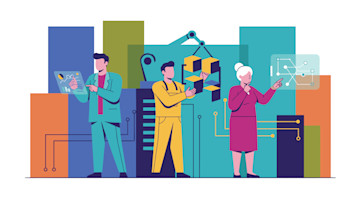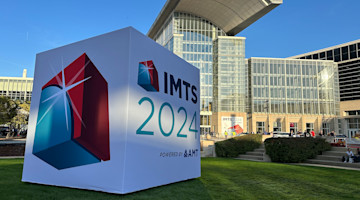In January 2024, European industrial manufacturing demonstrated signs of recovery despite ongoing challenges. The eurozone manufacturing PMI for January 2024 stood at 54.2, indicating expansion, with Germany's PMI at 55.5 and France's at 51.8. Industrial production saw a positive trend, with Eurostat reporting a month-over-month growth of 1.2% and a year-over-year growth of 3.5%. Manufacturing sales volumes in key sectors like automotive, machinery, and electronics were $43 billion, $27 billion, and $33 billion, respectively.
However, challenges persisted, including rising energy costs and raw material shortages impacting production schedules and profitability. Despite this, the EU's exports of manufactured goods reached $194 billion in January 2024, with significant exports to the United States, China, and the United Kingdom. The region maintained a trade surplus of $22 billion for manufactured goods, indicating competitiveness in global markets.
German machine tool production is expected to decline by almost 3% to $15.91 billion in 2024 (compared to $18.27 billion in 2018-2019), contrasting with the growth of sectors like electric vehicles (EVs), wind power, medical technology, aerospace, and defense.
The German automotive sector is expected to grow 2.5% in vehicle production in 2024, surpassing the projected 1.4% growth in the country's real GDP. By 2030, Germany is projected to produce 5.3 million vehicles annually. This growth is attributed to the expansion of the automotive industry, particularly in the EV sector. However, the industry faces significant challenges, including the transition to EVs and industrial policy uncertainties.
A few recently announced projects and investments of note:
Chinese automaker BYD is set to build a new state-of-the-art passenger car factory in Szeged, Hungary. The facility will be equipped with the most advanced technology and production lines and feature a highly automated production process. While financial investment details were not disclosed, the Hungarian foreign minister has stated that it is “one of the largest investments in Hungarian economic history.” The company plans to produce 200,000 cars annually at full capacity.
Vestas announced plans to build a new factory in Szczecin, Poland, to produce V236 blades for 15 MW offshore wind turbines. The factory will be fully operational by 2026. Additionally, another Vestas factory will be built in the area, which is set to start operations in 2025.
The partnership of Stellantis and Chinese EV battery manufacturer CATL is set to build a new lithium-iron-phosphate battery facility in Spain. The project aims to build high-quality yet affordable batteries to become more competitive. These batteries will be used in Citroen C3 models. The investment for this venture will get close to $2.7 billion with governmental subsidies promised to reach right below $110 million.
ContiTech, a division of Continental, is actively pursuing carbon neutrality for its factories. The Timisoara facility in Romania has taken a significant step by installing its photovoltaic system, which aims to generate 930 MWh. The overarching goal is for Continental facilities to produce 20% of their energy on-site by 2030. Moreover, these facilities will undergo expansions to accommodate new, modern, and sustainable production lines. The Timisoara facility expansion will receive an initial investment of $43 million.
Serres Val de Loire, a French company specializing in tunnel greenhouses and equipment, is poised to inaugurate an expansive new factory in Longue-Jumelles by year's end. The venture, backed by an $8-million investment from Sem Alter Eco, marks a significant milestone for both the family business and the Anjou Actiparc region. The state-of-the-art facility will incorporate advanced machinery to curtail production costs and enhance overall productivity.
The European Commission is gearing up to establish the first major generative AI factory. It is currently finalizing the strategic framework for the project. This facility will play a crucial role in enforcing the EU AI Act, which is set to become legislation by 2025. Positioned as a "one-stop shop," it aims to propel AI progress in Europe, providing a comprehensive platform with high computing power, data, algorithms, and top-tier talent – all while maintaining a strong commitment to ethical responsibility. The initiative will foster an open ecosystem of public supercomputers, granting access to startups and researchers. The new factory seeks to drive investment in European startups to $4 billion by 2027 and will be initially supported by key institutions like Horizon Europe and Digital Europe. The Alliance for Language Technologies is among the companies advocating for this facility, which will address the deficiency in AI training across the continent.
Vulkam, a startup specializing in amorphous metals – also known as metallic glasses – has secured $36 million in funding for the construction of its inaugural factory. The funding includes $15 million in equity from SPI2, a division of BPI France, along with contributions from Inco Ventures and SEB Alliance. Additionally, $16 million has been secured as debt from BPI France, complemented by financial support from the French government. Based in Isere, the company aims to produce 2 million pieces annually in its new facility post-2025, with plans to scale up to 4 million by 2026.
BMW is investing $711 million to retool its Munich headquarters to exclusively produce EVs from the end of 2027, a major steppingstone in the transition to the electric age. BMW is constructing four buildings, including a new vehicle assembly line and body shop, and has moved traditional engine manufacturing to Great Britain and Austria.
For more information, please contact Conchi Aranguren at caranguren@AMTonline.org.






